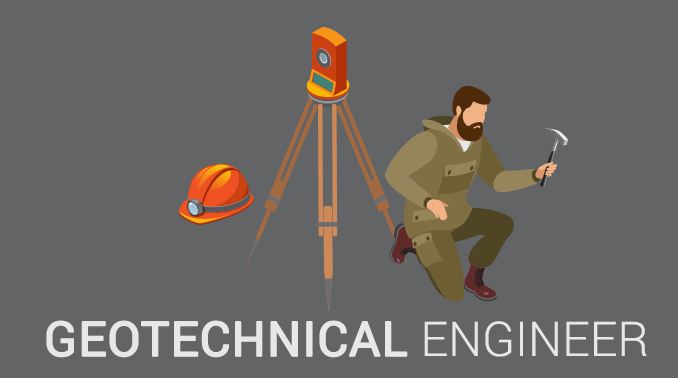The 7-Minute Rule for Geotheta
Table of ContentsThe 5-Second Trick For GeothetaThe Ultimate Guide To GeothetaLittle Known Facts About Geotheta.Facts About Geotheta UncoveredThe Main Principles Of Geotheta

They carry out website examinations, accumulate examples, carry out laboratory tests, and examine information to examine the suitability of the ground for construction jobs - Geo Tech Engineer. Based on their searchings for, geotechnical designers supply recommendations for foundation design, incline security, preserving structures, and mitigation of geotechnical dangers. They collaborate with other professionals, such as designers, structural engineers, and construction teams, to make certain that geotechnical factors to consider are integrated into the total job layout and application
By examining the habits and homes of dirt and rock, they can identify potential geotechnical hazards such as landslides, dirt settlement, or slope instability. Their knowledge aids prevent failings or crashes that could endanger lives and residential property. Below are some detailed responsibilities and responsibilities of a geotechnical engineer: Website Investigation: Geotechnical designers conduct site investigations to gather information on subsurface problems.
They analyze the information to understand the buildings and actions of the soil and rock, including their toughness, leaks in the structure, compaction qualities, and groundwater conditions. Geotechnical Analysis and Layout: Geotechnical engineers assess the information collected throughout site examinations to analyze the stability and suitability of the site for building tasks. They perform geotechnical estimations and modeling to evaluate elements such as bearing ability, settlement, slope security, side planet stress, and groundwater flow.
A Biased View of Geotheta
Structure Style: Geotechnical designers play an important role in creating structures that can securely support the intended structure. They analyze the soil conditions and tons requirements to figure out the ideal structure type, such as superficial structures (e.g., footings), deep foundations (e.g (https://www.pubpub.org/user/ian-hammond)., heaps), or specialized strategies like soil enhancement. They think about variables such as negotiation limitations, birthing capacity, and soil-structure communication to create optimal structure designs
They examine construction strategies, monitor site activities, and conduct field assessments to verify that the style recommendations are adhered to. If unanticipated geotechnical concerns occur, they evaluate the situation and supply referrals for remediation or changes to the style. Risk Analysis and Reduction: Geotechnical engineers analyze geotechnical hazards and threats related to the project site, such as landslides, liquefaction, or dirt disintegration.

Partnership and Interaction: Geotechnical engineers work closely with other professionals entailed in a project, such as designers, architectural engineers, and construction groups. Efficient interaction and partnership are vital to incorporate geotechnical factors to consider into the general task style and building process. Geotechnical designers provide technological expertise, response inquiries, and guarantee that geotechnical requirements are satisfied.
The Definitive Guide to Geotheta
Below are some kinds of geotechnical designers: Foundation Engineer: Foundation designers concentrate on developing and analyzing foundations for structures. They evaluate the soil problems, tons requirements, and website qualities to establish the most ideal structure type and design, such as superficial structures, deep foundations, or specialized methods like pile foundations.
They review the aspects affecting slope security, such as dirt residential or commercial properties, groundwater conditions, and incline geometry, and create strategies to avoid slope failures and reduce dangers. Earthquake Designer: Quake designers specialize in examining and creating structures to endure seismic forces. They evaluate the seismic threat of a website, evaluate soil liquefaction possibility, and create seismic layout requirements to make sure the safety and resilience of frameworks during quakes.
They execute field screening, collect samples, and evaluate the collected information to characterize the soil homes, geologic formations, and groundwater conditions at a website. Geotechnical Instrumentation Designer: Geotechnical instrumentation designers concentrate on surveillance and gauging the behavior of soil, rock, and frameworks. They set up and maintain instrumentation systems that check variables such as dirt negotiation, groundwater levels, incline motions, and structural displacements to evaluate efficiency and offer early warnings of prospective problems.
What Does Geotheta Do?
They conduct tests such as triaxial examinations, combination examinations, direct shear examinations, and leaks in the structure examinations to gather data he said for geotechnical evaluation and design. Geosynthetics Designer: Geosynthetics designers specialize in the design and application of geosynthetic materials, such as geotextiles, geogrids, and geomembranes. They use these products to boost dirt stability, reinforce inclines, supply drainage remedies, and control erosion.
They tend to be investigative people, which suggests they're intellectual, reflective, and inquisitive. They are curious, systematic, sensible, logical, and logical. Some of them are also social, implying they're kind, charitable, cooperative, individual, caring, practical, understanding, sensible, and pleasant. Does this audio like you? Take our free career test to learn if geotechnical engineer is one of your leading job suits.
In the workplace atmosphere, geotechnical engineers make use of specialized software program tools to do computations, produce styles, and evaluate information. They prepare reports, evaluation task requirements, connect with clients and staff member, and coordinate project tasks. The workplace setting supplies a conducive atmosphere for research, analysis, and cooperation with other experts involved in the project.
Some Known Facts About Geotheta.
They frequently go to job sites to perform site investigations, assess geotechnical conditions, and gather data for analysis. These visits involve traveling to different areas, sometimes in remote or challenging terrains. Geotechnical engineers may execute dirt sampling, conduct tests, and monitor construction activities to ensure that the geotechnical elements of the job are being implemented correctly.
Geotechnical designers also work in specialized geotechnical laboratories. Geotechnical research laboratory designers work thoroughly in these environments, managing screening devices, operating instruments, and videotaping data.